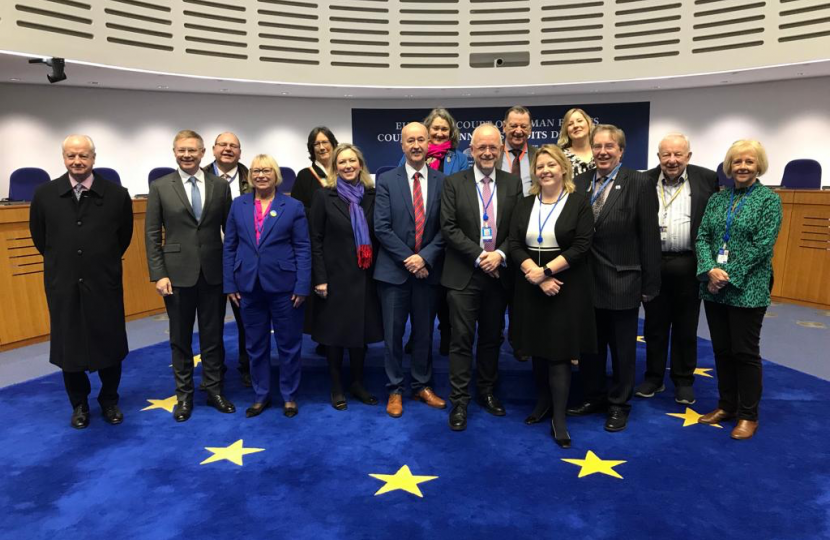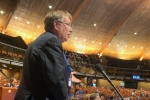
The Parliamentary Assembly of the Council of Europe has four Plenary Session each year. Below is John's Delegation Leader report for the January 2023 session.
Leader's Introduction
We have just held the first part-Session of the Parliamentary Assembly of the Council of Europe for 2023 in Strasbourg. The theme that ran throughout the week was just how much the UK was doing to lead debates and contribute to the proceedings of the Assembly. I was pleased to extend my welcome to new members of the UK Delegation who had recently been appointed: Nickie Aiken, Harriett Baldwin, Jo Gideon, Sally-Ann Hart, David Morris, Jill Mortimer and Sheryll Murray. They made very valuable contributions to the debates as indicated below as did our established members.
In summary, in addition to these debates my Report on ecocide and protecting the environment in times of armed conflict was passed unanimously and has been picked up by the Icelandic Prime Minister as something to be included in the 4th Summit of the Council which will take place in Iceland in May. Duncan Baker MP led a debate on the ethical, cultural and educational challenges of contact tracing applications which was also approved unanimously.
I also led a current affairs debate on tensions between Serbia and Kosovo. In addition I attended a meeting of the Committee of Ministers (the second chamber of the Council) to talk through my visit to Osman Kavala, human rights prisoner in Turkey, and to discuss what next to do. Finally, I chaired two sessions of the Parliamentary Assembly as Vice President. The following also took the leading role on behalf of their political groups during a number of debates: Lord Keen, John Howell MP, Jeremy Corbyn MP, Sir Edward Leigh MP, Jill Mortimer MP and Nickie Aiken MP. All of this, together with the individual speeches made, meant that the UK took a leading position during the week which I aim to build on in the future.
Best wishes, John Howell OBE MP, Leader of the UK Delegation
REPORT JANUARY 2023 PLENARY SESSION
The important debates included:
Environmental impact of armed conflicts. In this debate I introduced the extension of the term ecocide to the Council of Europe and recommended a new convention or treaty to take this and the protection of the environment in times of armed conflict forward. It is likely to make a significant contribution to what the Council of Europe can offer. This debate was supported by Jeremy Corbyn MP and Ruth Jones MP and with contributions from Geraint Davies MP and Lord Blencathra.
Contact tracing applications: ethical, cultural and educational challenges. Duncan Baker MP pointed to the familiarity with contact tracing applications which occurred following the pandemic and the dilemmas they had thrown up. As the Report demonstrated, a key part of the process of evaluating them lies in addressing the difficult challenges – from ethical to cultural – and educational. These need to be discussed and dealt with before any state rollout of contact tracing applications can feasibly take place.
The Reykjavik Summit of the Council of Europe. An important debate took place on the Summit proposed for May 2023 in Reykjavik to work out the future direction of the Council of Europe. The Rapporteur made much of the terrible situation in Ukraine and the need to ensure that Russia was held accountable. She pointed out that the values of Europe had not changed. John Howell MP, Lord Foulkes, Lord Keen and Sir Edward Leigh MP participated.
Conflict-related sexual violence. In the report on conflict-related sexual violence, two principal elements were enshrined – prevention and the legal situation. The sensitivity of going to court was explored. The debate heard contributions from Nickie Aiken MP, Lord Griffiths, John Howell MP and Ruth Jones MP.
Recent tensions between Pristina and Belgrade. I led a current affairs debate on the tensions between Belgrade and Pristina, considering whether this was just an attempt by Mr Putin to use Serbia as an excuse to open up a second front in the Balkans. We also pressed for Kosovo’s membership of the Council of Europe to be brought forward.
The Istanbul Convention. The debate which took place on the Istanbul Convention looked considered the role of men and boys in helping to prevent sexual violence, and the issue of marital captivity. The Istanbul Convention is the gold standard Treaty on the protection of women and girls which the UK ratified in 2022. The debate was well supported with contributions from Nickie Aiken MP, John Howell MP, Lord Griffiths, Hannah Bardell MP and Jeremy Corbyn MP.
Legal and human rights aspects of the Russian Federation’s aggression against Ukraine. In this debate the Assembly heard from the Head of the Centre for Civil Liberties and 2022 Nobel Peace Prize laureate Ms Oleksandra Matviichuk. It was pointed out that Russia's war of aggression against Ukraine has caused profound suffering in Ukraine, thousands of civilians have been killed or injured, and countless others have been forced to seek refuge elsewhere in the country or elsewhere in Europe. As a human rights defender, Ms Matviichuk had been documenting war crimes in this conflict since 2014. The debate was supported by contributions from Sir Edward Leigh MP and Lord Blencathra.
The Assembly also held debates on Emergence of lethal autonomous weapons systems (LAWS) and their necessary apprehension through European human rights law and Building the Open Council of Europe Academic Networks (OCEAN) in which Lord Dundee participated.
We also had a debate on how to address the issue of Daesh foreign fighters and their families returning from Syria and other countries to the member States of the Council of Europe, in which Lord Griffiths participated. Individual presentations were made by Ms Katrín Jakobsdóttir, Prime Minister of Iceland, Ms Annalena Baerdbock, Minister for Foreign Affairs of Germany and from Council of Europe Secretary General Ms Marija Pejčinović Burić.
Addressing the humanitarian consequences of the blockade of the Latchin corridor. This debate took place under the current affairs procedure. The Lachin corridor is a strip of territory about 5 km wide that connects 65 km of the Armenian border with the territory called Nagorno-Karabakh or Artsakh by Armenia and Karabakh by Azerbaijan. The issue is based on the formal request in early December by the Government of Azerbaijan to stop the exploitation of mines in Nagorno-Karabakh which is considered to be illegal and which would cause damage to the environment. The Armenian camp considers that there is a real blockade organised by pseudo-demonstrators, using the mining issue as a pretext. The debate was supported by Jill Mortimer MP.
European Court of Human Rights. Thanks to our Ambassador in Strasbourg, Sandy Moss, and the UK’s excellent Judge, Tim Eicke KC a visit to the European Court of Human Rights was organised for the Delegation. Members heard how very few cases against the UK ever reached the Court. The visit proved a good opportunity to look at how the Court operates in relation to existing courts in the UK.
The next Plenary Session of the Parliamentary Assembly will take place 24-28 April 2023.


